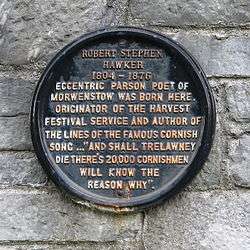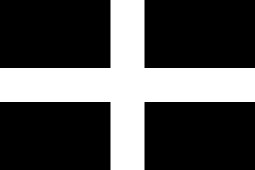The Song of the Western Men
| English: The Song of the Western Men | |
|---|---|
|
Plaque commemorating R. S. Hawker at Charles Church, Plymouth. | |
|
Regional anthem of Cornwall | |
| Lyrics | Robert Stephen Hawker, 1824 |
| Music | Robert Stephen Hawker, 1824 |
"The Song of the Western Men", also known as "Trelawney", is a Cornish patriotic song, written in its modern form by Robert Stephen Hawker in 1824, but having roots in older folk songs.
Hawker, a churchman, assumed that the Trelawny mentioned in the song was Sir Jonathan Trelawny, the Bishop of Bristol, who had been imprisoned in the Tower of London by King James II in 1688. However it is more likely that it referred to his grandfather, Sir John Trelawny, a Cornish Royalist leader who had been imprisoned by parliament in 1628.[1][2]
According to Cornish historian Robert Morton Nance, "The Song of the Western Men" was possibly inspired by the song "Come, all ye jolly tinner boys" which was written more than ten years earlier in about 1807, when Napoleon Bonaparte made threats that would affect trade in Cornwall at the time of the invasion of Poland. Ye jolly tinner boys contains the line "Why forty thousand Cornish boys shall knawa the reason why."[3]
The song has become one of the unofficial anthems of Cornwall and is a regular favourite sung at Cornish rugby union matches and other Cornish gatherings. In some schools in Cornwall, the children are taught the first verse and chorus, and sing it at events such as Murdoch Day and St Piran's Day.
However, the people of Cornwall did not march to rescue Trelawny, as told in the song. He was imprisoned in the Tower of London for three weeks, then tried and acquitted.[4]
Trelawny Lyrics
"Trelawny"
A good sword and a trusty hand!
A merry heart and true!
King James's men shall understand
What Cornish lads can do!
And have they fixed the where and when?
And shall Trelawny die?
Here's twenty thousand Cornish men
Will know the reason why!
- And shall Trelawny live?
- Or shall Trelawny die?
- Here's twenty thousand Cornish men
- Will know the reason why!
Out spake their Captain brave and bold:
A merry wight was he:
Though London Tower were Michael's hold,
We'll set Trelawny free!
'We'll cross the Tamar, land to land:
The Severn is no stay:
With "one and all," and hand in hand;
And who shall bid us nay?
- And shall Trelawny live?
- Or shall Trelawny die?
- Here's twenty thousand Cornish men
- Will know the reason why!
And when we come to London Wall,
A pleasant sight to view,
Come forth! come forth! ye cowards all:
Here's men as good as you.
'Trelawny he's in keep and hold;
Trelawny he may die:
Here's twenty thousand Cornish bold
Will know the reason why
- And shall Trelawny live?
- Or shall Trelawny die?
- Here's twenty thousand Cornish men
- Will know the reason why!
Translation into Cornish
There are two versions of the song in Cornish. The first was written by Henry Jenner in 1905:
|
'Ma lel an leuv, 'ma'n kledha mas Yw ornys le ha prys ankow?
'Medh aga Hapten, krev ha dreus, "Ni 'dres an Tamar, tir dhe dir,
"Pan wrellen dos dhe Fos Loundres, "Yn karhar kelmys rag ankow
|
Gans kledha da ha dorn yw lel,
Yn-medh an kapten, byw y woos,
Devedhys bys yn fos Loundres
|
Notes
- The original words were written about Sir John Trelawny (grandfather of the Bishop) who was leader of the King's party in Cornwall and on 13 May 1627 was committed to the Tower by the House of Commons for certain "offences against the liberty of free election" and contempt of the House.[5]
- "Michael's Hold" may refer to Archangel Michael, commander of the legions of Heaven. Other sources say the line refers to a hold on St Michaels Mount (i.e. a prison or cell).
- There is some doubt as to whether the work was entirely original or an adaptation of an earlier tune, perhaps referring to the "An Gof" Cornish Rebellion of 1497.
- "Trelawny" is often referred to as the "unofficial" Cornish anthem and the most popular which is heard at Cornish rugby union matches and other Cornish gatherings, but the Cornish anthem that has been used by Gorseth Kernow for the last 75 plus years is "Bro Goth Agan Tasow" ("The Land of My Fathers", or, literally, "Old Country of our Fathers") with a similar tune to the Welsh national anthem ("Hen Wlad Fy Nhadau") and the Breton national anthem. "Bro Goth Agan Tasow" is not heard so often, as it is sung in Cornish). Those who prefer an anthem in English often use "Hail to the Homeland".
See also
References
- ↑ "Robert Stephen Hawker: Trelawny". Hawker Society, Angela Williams. Retrieved 27 October 2013.
- ↑ Piers Brendon, Hawker Of Morwenstow: Portrait of an Eccentric Victorian, Random House, 2011
- ↑ RootsWeb: CORNISH-L [CON] Trelawney
- ↑ https://www.cornwalls.co.uk/history/people/john_trelawny.htm
- ↑ Charles Edward Byles (1904). The Life and Letters of R. S. Hawker (Sometime Vicar of Morwenstow). London: John Lane. p. 30.
External links
- "The Song of The Western Men" at RobertStephenHawker.co.uk
- The Life and Letters of R. S. Hawker from the Internet Archive
- Words in Cornish from the Federation of Old Cornwall Societies website
- Trelawny's Army (with notes by R. S. Hawker)
- "The Song of the Western Men" from Everything2

